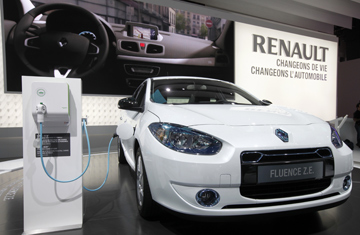
A Renault Fluence Z.E. electric car is displayed on media day at the Paris Auto show, September 30, 2010
Correction Appended: January 11, 2010
At first glance, news that Renault's cutting-edge electric-car program appears to have fallen victim to industrial espionage is especially remarkable due to the suspects: three top company executives, including a member of the firm's management committee. But the alarm that the revelation has provoked in France is also a measure of how big a threat corporate spying has become to French industry — and an indication of just how common that covert activity has become elsewhere, too.
"It's a broad threat to French industry, [and though] the expression 'economic war' is often outrageous, it is appropriate this time," French Industry Minister Eric Besson told RTL radio on Jan. 6, referring to the Renault saga. "It highlights the risks that our companies face from industrial spying."
French politicians and media expressed similar consternation after Renault's Jan. 5 announcement that it is reviewing actions by the three executives — and preparing legal action against them. That move follows a five-month internal investigation that found the trio had "committed misconduct that infringes Renault's ethics, [and] consciously and deliberately [endangered] the company's assets," according to a company statement.
Though little other information is being given about the affair, Renault's COO Patrick Pelata, told Le Monde Jan. 8 that the breach appears less serious than initially feared, and that "nothing critical seems to have gotten out...not the smallest nugget of technical or strategic information on the innovation plan has filtered out of the company." That calmed earlier fears that whatever information was compromised by the three managers represents a grave threat to the company's electric-car program, a project that Renault and its Japanese partner Nissan have committed $5.3 billion to developing. Renault's strategy has been to focus on a motor powered entirely by battery, rather than the gas/electric hybrids most American, Japanese, and European rivals have favored. The company is planning four electric car model launches over the next two years, and has patents pending or in preparation for around 205 designs. Renault estimates electric cars will represent 10% of the entire automobile market by 2020.
The automotive industry provides nearly 10% of all jobs in France, and repeated efforts by foreign corporate spies targeting companies in the sector — including component maker Valeo in 2005 and tire giant Michelin in 2008 — have raised fears that the country's remaining economic advantage is being breezily pilfered. "Labor costs aren't France's competitive advantage," Pierre Lellouche, French secretary of state for foreign trade, said the day after Renault's announcement. "It's innovation and our advanced technology."
It's still unknown who sponsored the effort to pilfer Renault's research and development. Pelata told Le Monde the company appeared to have been the victim of "a system organized to collect economic, technological and strategic information to serve interests abroad." France's main intelligence service is now investigating the matter. Meanwhile, suspicion remains high that Chinese automotive interests are behind the effort — speculation that experts say is justified based on previous incidents.
"China has repeatedly been caught spying in this sector — notably at Valeo — and we know the Chinese are working very hard to build their automotive industry quickly, and inexpensively," notes Eric Denécé, director of the French Center on Intelligence Research. "European and Japanese rivals have enough information in this area to make such risky spying unnecessary. Americans and the British have such good technology that they don't bother trying to steal it."
Which isn't to say that developed economies are the only ones at risk to corporate espionage. Denécé estimates that around 90% of all corporate intelligence gathering is done by companies using the private services of former spies, often in more affluent countries. Objectives and techniques differ greatly, he says. The richer the country and company doing the spying, the less likely it is to run the risk of obtaining technology or information that's similar or inferior to what it already possesses.
"American companies mostly seek sensitive information that will allow them to destabilize rivals or the entire sector to gain strategic advantages in areas like contract bidding," remarks Denécé, who says aircraft makers are notorious for exploiting anything they can learn about rivals to present to clients as proof of dodgy safety levels or inflated pricing. "Globally, about half of all corporate espionage involves that kind of activity, the other half involves stealing technology or business strategies."
And the authorities aren't much help. Most Western agencies formerly tasked with counter-espionage — including economic — now focus almost exclusively on the terrorism threat. The result is a rising number of companies discovering they've been victimized in some manner — nearly 3,000 annually in France alone.
How to combat it all? French leaders are calling on companies to protect themselves better, and legislators are considering draft laws that require companies that receive state grants, a group that includes Renault, to meet strict security measures — or else see their executives face jail time.
The original version of this story stated that Renault's Patrick Pelata is chief executive officer. He's the chief operation officer.
